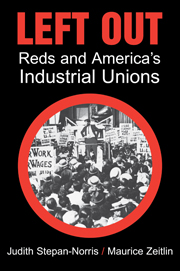Book contents
- Frontmatter
- Contents
- List of Figures and Tables
- Prefatory Note
- Acknowledgments
- Abbreviations
- 1 The Congress of Industrial Organizations: Left, Right, and Center
- 2 “Who Gets the Bird?”
- 3 Insurgency, Radicalism, and Democracy
- 4 Lived Democracy: UAW Ford Local 600
- 5 “Red Company Unions”?
- 6 Rank-and-File Democracy and the “Class Struggle in Production”
- 7 “Pin Money” and “Pink Slips”
- 8 The “Big 3” and Interracial Solidarity
- 9 The Red and the Black
- 10 Conclusion: An American Tragedy
- 11 Epilogue: The “Third Labor Federation” That Never Was
- References
- Author Index
- Subject Index
3 - Insurgency, Radicalism, and Democracy
Published online by Cambridge University Press: 28 July 2009
- Frontmatter
- Contents
- List of Figures and Tables
- Prefatory Note
- Acknowledgments
- Abbreviations
- 1 The Congress of Industrial Organizations: Left, Right, and Center
- 2 “Who Gets the Bird?”
- 3 Insurgency, Radicalism, and Democracy
- 4 Lived Democracy: UAW Ford Local 600
- 5 “Red Company Unions”?
- 6 Rank-and-File Democracy and the “Class Struggle in Production”
- 7 “Pin Money” and “Pink Slips”
- 8 The “Big 3” and Interracial Solidarity
- 9 The Red and the Black
- 10 Conclusion: An American Tragedy
- 11 Epilogue: The “Third Labor Federation” That Never Was
- References
- Author Index
- Subject Index
Summary
Five years into his presidency of the UAW, and four years after he launched his swift political “fumigation” of the UAW's Red “filth,” Walter Reuther still found himself encountering too much dissidence. “Everybody has a right to his own opinion …,” he pleaded at the UAW's 1951 convention. “You are going to have contests for offices. … But let's have democratic contests without factionalism. Let's have democracy but not factionalism.”
Real, contingent political struggles like the ones that had elevated Reuther to the UAW's presidency in 1946 and through which his faction had then defeated the “center-left” coalition in 1947 – and which, despite his steel grip on power, he was still being compelled to wage four years later to consolidate his new “one-party political machine” – have no place in the conventional organizational paradigm inspired by Robert Michels. Instead, an “inevitable current,” fed by hidden, and undemonstrable, organizational “needs” for stability, security, and continuity, carries labor unions toward their preordained destiny. The “spread of bureaucracy and the decay of democracy in trade unions” is an inherent “tragedy of organization.” The “quest for union democracy” is thus “futile.” In sum, oligarchy is an “immanent necessity,” dictated by an “iron law.”
What used to pass as “evidence” for this putative “iron law of oligarchy” was the “fact” that, in mid-twentieth-century America, “most unions” in the United States were ruled by an “entrenched oligarchy” facing no “internal opposition.”
- Type
- Chapter
- Information
- Left OutReds and America's Industrial Unions, pp. 54 - 94Publisher: Cambridge University PressPrint publication year: 2002



